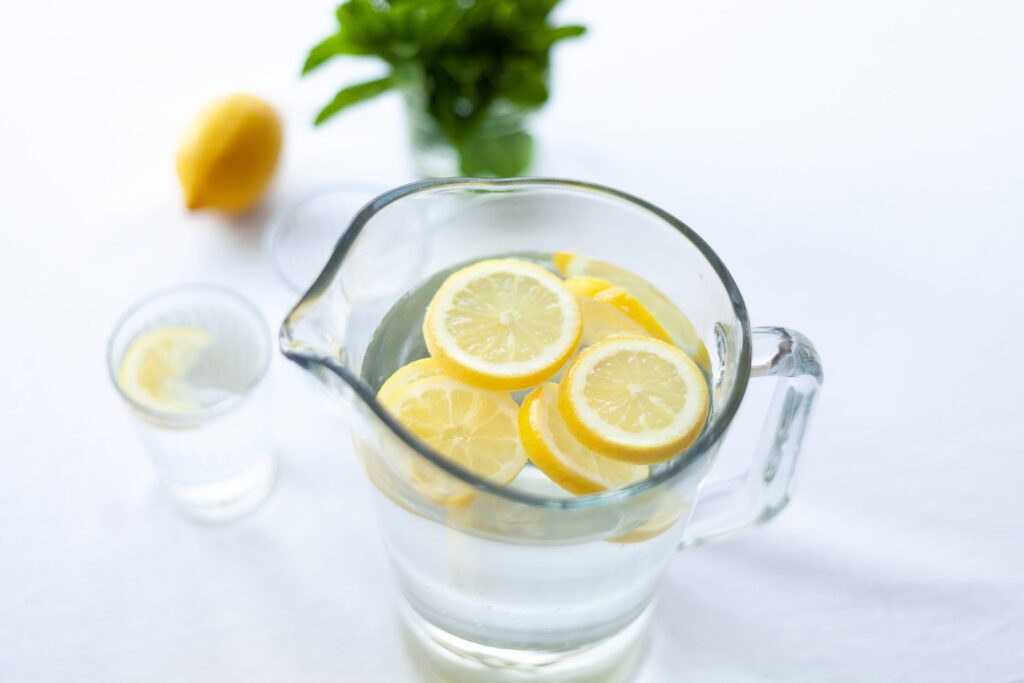Kinds of Diets
Does Lemon Water Cause Dehydration
During the course of the day, do you enjoy drinking water with lemon in it? Although it is a delicious and invigorating alternative to regular water, have you ever considered the possibility that it could cause you to get dehydrated? Let’s put an end to this once and for all by putting it behind us.
The Myth of Lemon Water Dehydration
There appears to be a widespread misperception that lemon water dehydrates you. This, however, is not totally correct. While the natural citric acid in lemon water has a diuretic effect, it is unlikely to induce dehydration. In reality, lemon water can be hydrating since it contains both water and electrolytes. Lemons’ tiny amount of natural sugars and vitamins might also help with overall hydration.
It is critical to distinguish between a diuretic effect and true dehydration. A diuretic is any chemical that stimulates the production of urine. Although lemon water has a diuretic effect, it does not necessarily dehydrate you. The diuretic effect of lemon water is modest, and extensive consumption would be required to have a major impact on hydration levels.

Understanding the Benefits of Lemon Water
Lemon water has grown in popularity due to its flavor as well as its possible health advantages. It is high in vitamin C, which has been shown to strengthen the immune system and enhance collagen formation. Lemon water also includes antioxidants, which can help fight free radicals and reduce inflammation. It may also assist digestion and enhance skin health.
Lemon Water and Hydration
Water is the fundamental source on which our bodies rely for hydration. However, lemon water can still help you meet your daily fluid requirements. Lemon water’s high water content helps to satisfy thirst and replenish fluids. The added electrolytes, such as potassium and magnesium, can help support hydration by maintaining the balance of fluids and minerals in our systems.
According to studies, lemon water can enhance urine output but has no effect on hydration levels. In a study published in the Journal of Clinical Biochemistry and Nutrition, participants who drank lemon water increased their urine production while maintaining their hydration status. This implies that drinking lemon water does not dry the body.
Factors That Affect Hydration
It’s crucial to remember that hydration is influenced by a variety of factors, including environment, physical activity, and personal preferences. Our bodies may require more fluids to stay hydrated in hotter regions or after heavy exercise. Lemon water can be a tasty and refreshing method to meet these increased fluid requirements. However, it is critical to pay attention to your body’s signals and adapt your lemon water consumption accordingly.

How to Incorporate Lemon Water into Your Daily Routine
If you want to incorporate lemon water into your daily routine, there are various options. The most straightforward technique is to squeeze fresh lemon juice into a glass of water. Begin with a little amount of lemon juice and gradually increase the amount to suit your tastes. To give a moderate citrus flavor to the water, add lemon slices or wedges.
Consider experimenting with different lemon water variations to make it even more delightful. For a refreshing variation, add a sprig of fresh mint or a couple slices of cucumber. For additional taste, use a pinch of sea salt or a splash of honey. Get imaginative and find a flavor combination that appeals to you.
Lemon Water Recipes and Variations
- Lemon Ginger Detox Water: In a pitcher of water, combine fresh lemon slices, fresh ginger slices, and a handful of mint leaves. Allow the mixture to soak for a few hours in the refrigerator before serving.
- Lemon Cucumber Spa Water: In a glass pitcher, combine slices of fresh lemon and cucumber. Fill with water and a few sprigs of fresh basil. Allow it to sit for a few hours to allow the flavors to blend.
- Lemon Berry Infused Water: Muddle a handful of fresh berries (strawberries, blueberries, or raspberries) in a big jar or pitcher. Fill with water and lemon wedges. Allow at least an hour for the flavors to blend before serving.
Other Health Benefits of Lemon Water
Apart from its possible hydration benefits, lemon water has a number of other health advantages. Lemons include vitamin C, which can assist support immune function and protect against common infections. The antioxidant components of lemon water may also help to better skin health and a more youthful appearance. Furthermore, the citric acid in lemons may assist digestion by stimulating stomach acid production.

Debunking Common Misconceptions
There are a number of myths about lemon water that need be dispelled. One common misunderstanding is that lemon water, due to its acidic composition, can damage dental enamel. While lemons are acidic, drinking lemon water in moderation and rinsing your mouth afterwards can help to mitigate any potential harm. Additionally, drinking lemon water using a straw can aid to bypass your teeth and limit touch with your tooth enamel.
Another common misconception is that drinking lemon water can induce stomach ulcers or aggravate acid reflux. These claims, however, are not supported by scientific data. In reality, lemon water may have a relaxing impact on the digestive tract and aid in the relief of stomach symptoms.
Conclusion
In my experience, drinking water with lemon hasn’t led to dehydration. In fact, despite its slight diuretic effect, I’ve found that it contributes to overall hydration. With the high water content, electrolytes, and beneficial minerals in lemons, lemon water has become a go-to choice for a refreshing and healthful beverage.
It’s crucial to enjoy lemon water in moderation and be attuned to your body’s needs. By doing so, I’ve been able to maintain hydration levels while enjoying the many benefits of this citrus-infused drink. Cheers to staying refreshed and healthy!


